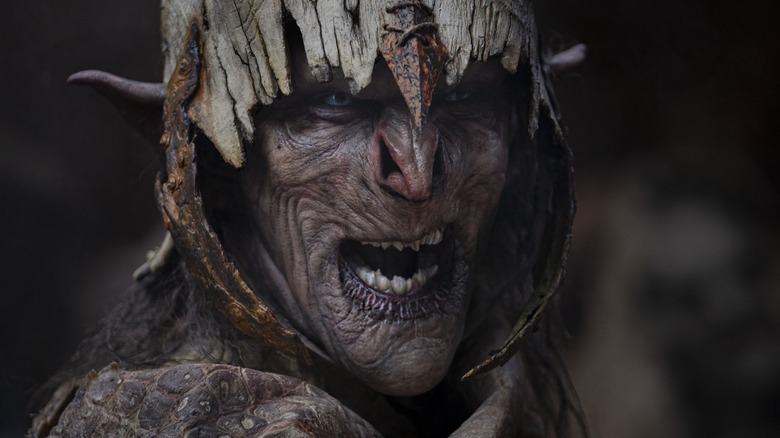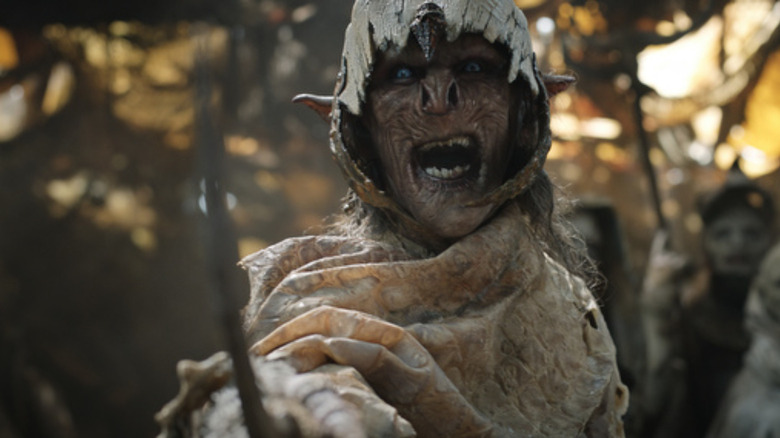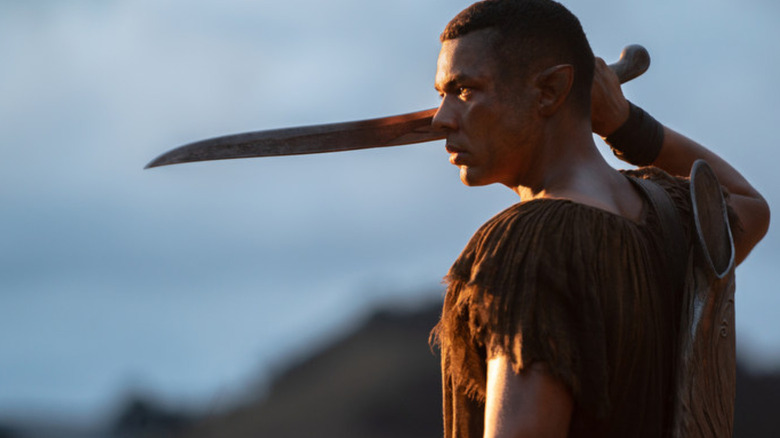The Rings Of Power Episode 4 Shows Middle-Earth's Orcs Observing An Unexpected Ritual
Contains spoilers for "The Lord of the Rings: The Rings of Power" Season 1, Episode 4
To quote a wise old wizard that may or may not have started as a total Stranger, "Many that live deserve death. And some that die deserve life." Well, now we're four episodes into Amazon Prime's "The Lord of the Rings: The Rings of Power," and boy, have we seen a fair bit of death. With Sauron's power stirring in The Southlands (which are becoming a Mordor-in-the-making), the blood of both elf and orc has been spilled, with one side overpowering the other. Of course, for both the most loyal J. R. R. Tolkien fans and casual "The Lord of the Rings" lovers, it's really nothing new. Same old Middle-earth, always warring.
And yet, in among the list of new additions to Middle-earth varying from characters to timeline tweaks, "The Rings of Power" has given us an exciting insight into a civilization that, up until now, hasn't been shown in the best light (mainly because they can't be caught in it). We're referring to the growing force of orcs keeping lone elf Arondir (Ismael Cruz Córdova) captive. A fierce bunch who still bear English Cockney accents as they did in Peter Jackson's take on Tolkien's work, we're shown a side to these feared creatures in this week's episode that we've never seen before.
Adar's last rites show how orcs handle death among their own
During our introduction to Adar (Joseph Mawle), we see him in the process of easing an orc in his final moments. The elf that has been corrupted by darkness shares a few words with this doomed follower before providing the necessary release. The whole encounter feels alien given that in just about every on-screen iteration of Middle-earth, we've been shown orcs that may have been fearful of death but never actually comforted when they found themselves close to it. The orcs we know and fear were more knuckle-dragging hordes that were subservient to higher powers, but this episode looks to be working toward a perspective that they're far more civilized than we give them credit for — in this age of Middle-earth, at least.
Episode 4 of "The Rings of Power" is starting to establish that those under Adar's command are a far more ritualistic and cult-like group than the more savage generation that would eventually go to war with Aragorn (Viggo Mortensen) and the later age of men. Referring to their leader in hushed tones in an organized group, even the clothes they wear feel more in line with that of a monstrous order of monks than the armored-up antagonists we've seen before. Considering this, might this take on the most feared creatures of Middle-earth be building on their history that we haven't seen on screen before?
Will The Rings of Power tell a fairer side to the story of the orcs?
While we've only had a brief time with Adar, whose plans still have yet to be fully revealed, his inclusion provides a perspective on the orcs that we've never seen before. The converted elf tells Arondir of lies that "run so deep even the rocks and roots don't believe them," and that "to untangle it all would all but require the creation of a new world." This suggests vengeance might be fuelling his dark deeds more than anything else. Deeds that might involve clarification on a chapter in the history of orcs that even J. R. R. Tolkien struggled to clear up during his later years.
In Peter Jackson's "The Lord of the Rings: The Fellowship of the Ring," Christopher Lee's Saruman explains that orcs used to be elves, but these nightmarish creatures have a complex history that is somewhat contradictory in Tolkien's original work. The mind behind Middle-earth explained that orcs were men and not elves or a hybrid of both, as he'd previously defined them. In essays from 1959-1960, titled "Quendi and Elder," Tolkien wrote, "It became clear in time that undoubted Men could under the domination of Morgoth or his agents in a few generations be reduced almost to the Orc-level of mind and habits." With this in mind, might Adar's plans be blowing the horn on the history of orcs wide open, and could it start with the message Arondir has been given? Keep a pointy ear out next week.


